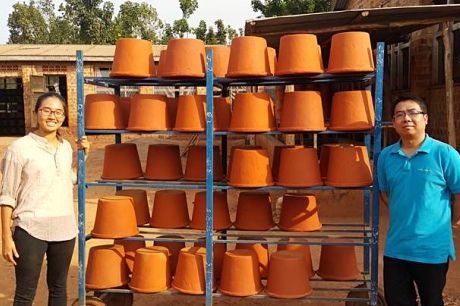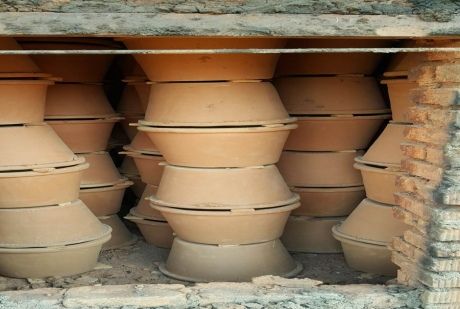Student Helps Uganda Improve Water Purification
Published on by Water Network Research, Official research team of The Water Network in Technology
Wirat Lerdprom, a PhD student from Imperial College London has shared his knowledge of ceramics with a charity to help improve the way water is purified in Uganda.

(L-R) Kathy Ku, the co-founder of Spouts, and Lerdprom with the water filters.
Wirat Lerdprom, a postgraduate student from the Department of Materials at Imperial College London, travelled to Uganda in January 2017. He was aiming to make a more efficient production process for manufacturing water filters developed by the charity Spouts of Water.
In Uganda, over ten million people lack access to a clean water source, resulting in negative health, social, economic and environmental consequences. Spouts of Water manufacture and distribute Purifaaya ceramic water filters using local materials, providing an affordable and easy-to-use solution for Ugandans to purify their water.
Lerdprom visited the rural factory in Uganda for five days. Using his knowledge of ceramics, he gave expert advice to the local workforce on how to improve the production process of the water filters.
His expertise helped to enhance the preparation of the raw materials, including the mixing and drying process of the ceramics, and improved the firing efficiency of ceramic whilst in the kiln. Since his first visit, the factory has increased the production yield of water filters from 55 per cent to 86 per cent - the best in their production since they started operating.
Dirt and bacteria are trapped in the filter

Holes in the clay only allow water molecules to pass through, leaving larger harmful dirt and bacteria trapped in the filter.
The Purifaaya ceramic water filters produced by Spouts use both physical filtration and chemical disinfection methods. Tiny holes within the clay only allow water molecules to pass through, leaving larger harmful dirt and bacteria trapped in the filter. A thin layer of silver nitrate is also infused within the filter to enhance bacteria removal.
The filters are made by local people using traditional methods, as rural locations and little money mean comprehensive modern production methods would not be possible to achieve. It also has the potential to reduce deforestation because less wood is needed to be collected by locals to purify water by boiling it. Manufacturing the filters in Seguku, where Wirat was based, and at multiple other Spouts factories around Uganda also has the potential to improve local economies by generating jobs.
Kathy Ku, the co-founder of Spouts, worked alongside Wirat in Uganda. Ku said: “Wirat was only able to visit Spouts for five days, but during those days, he was able to help make improvements and find solutions for problems we'd been struggling with for years.”
“Having his expertise come to our site, bringing both industry and academic know-how, was invaluable; we look forward to continuing our partnership with Wirat to help provide clean drinking water across Uganda.”
Read more on: Imperial College London
Media
Taxonomy
- Treatment
- Purification
- Water Access
- Filtration
- Water Supply
- water treatment
- Water Purification